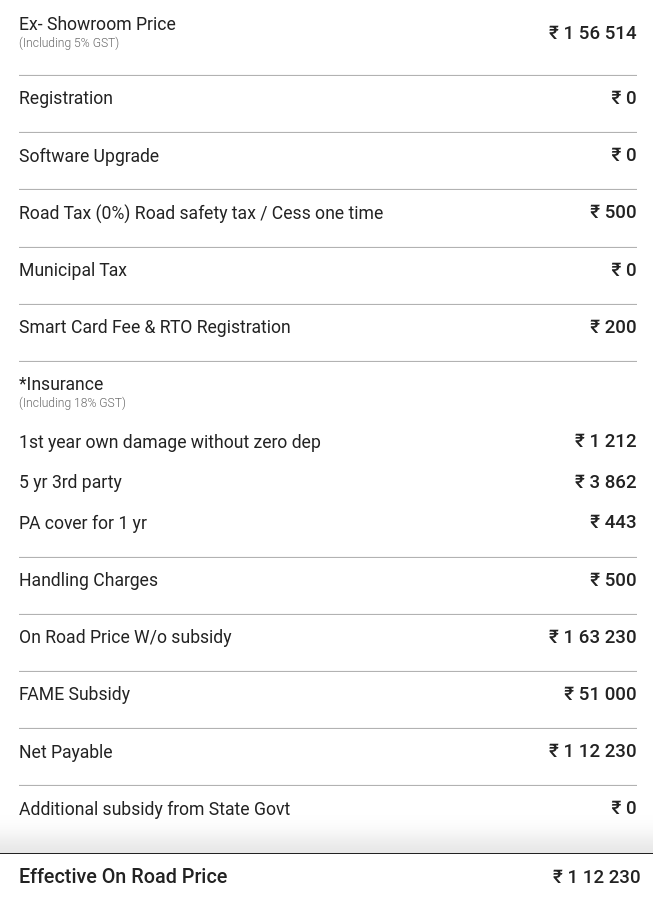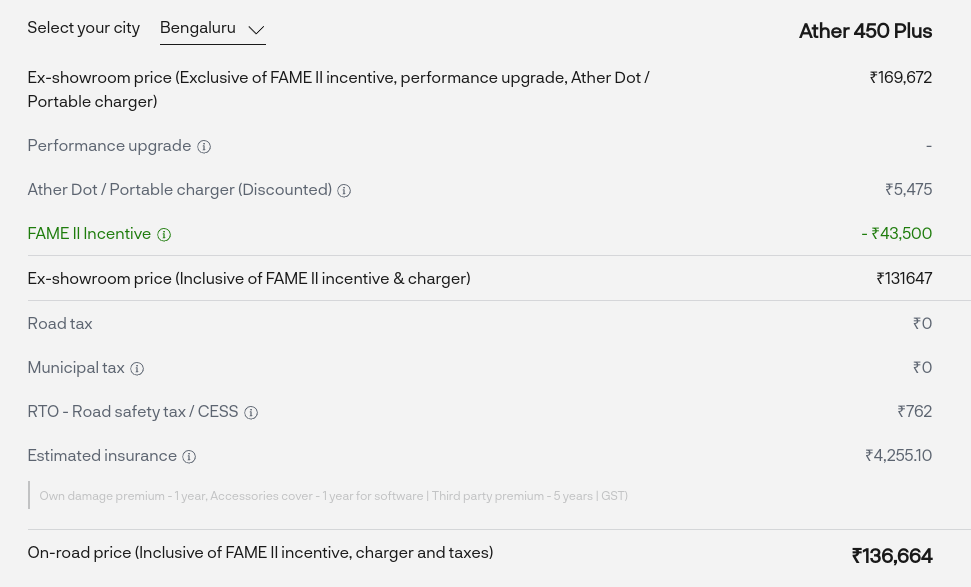Gasoline vs Electric Scooter Ownership Cost
If you have been following my last few posts, you might know that I have established that an electric car is probably not the right choice for us. First, it is not cost effective because we drive so little and the cost of ownership is cheaper with gasoline car if we drive anything less than 10,000 KMs/year. Second, during the odd times that we have to travel on long trips, an electric car fails to meet our requirements because of lack of proper infrastructure as of now. The alternative is to keep our old gasoline car and instead swap out our gasoline scooter with an electric one. Now, does it make financial sense to do it? Lets find out.
Like before, I don’t believe that electric scooters are much more environmentally friendly than corresponding gasoline ones. The reason is that the pollution caused by manufacturing batteries is not fully known. So we will keep that topic out of our discussion. While I would love to reduce environmental impact, I am certainly not buying an electric scooter with that hope given what I know so far. Unlike with the car comparison, I couldn’t find a gasoline and electric scooter that match very closely in terms of specifications.
The contenders
Without going too much into the details of specifications of each type of vehicle, I will select one for each type. The selection is based purely on what vehicle I would buy. This may be different for others. Note that I would only go for a scooter and not a motorcycle because then my wife and dad can also drive it. So, if I have to buy a gasoline two-wheeler today, I would go with either Honda Activa or TVS Jupiter. Lets go with Honda Activa 6G because I love the refinement of Honda engines :), but the differences between the two is almost negligible so you can swap one for the other in all the comparisons I make below.
One problem with no-brand electric scooters is that there haven’t been any reliable ones as of yet. I would doubt the quality of Ola scooter because they don’t have enough experience building vehicles and there are already cases of broken front suspension. Hero motocorp or TVS or Honda or Bajaj have years of experience building scooters. They know how to build sturdy and safe designs. Then there is the quality of batteries which seem to go up in flames because they were not designed for Indian weather conditions. Out of all the no-brand electric vehicles, the only one that I can trust is Ather. The other brands that are making electric vehicles (at the time of writing this post) that I can trust at least in terms of build quality are TVS and Bajaj.
Of course you cannot compare Activa with other electric vehicles with respect to features. For example, on Ather you get a 7” LCD display with navigation and music controls, you can connect your phone to the scooter and monitor various telemetry data etc. Like all electric vehicles, the torque will be amazing but top speed cannot match with a gasoline engine. You can reverse an electric scooter with ease because of the reverse assist. So we will overlook all these details during the comparison. Also I am not considering vehicles that cannot go beyond 45 kmph speed because that wouldn’t be practical even for city driving. So while Hero Electric has a few options I discarded them.
Upfront costs
The ex-showroom price of Activa 6G is Rs. 73,000 approximately. The registration charges are approximately Rs. 10,000, while the insurance cost is about Rs. 6000. I got the on road prices from websites like bikewale.com, zigwheels.com, bikedekho.com etc. I am not sure of the exact prices from a local dealer.
Coming to the cost of electric vehicles, I decided to check prices of all the three shortlisted EVs and go with the cheapest one. So here are the on road price lists in Bangalore according to their respective websites.
TVS iQube
Bajaj Chetak
Ather 450 Plus
I decided to go with TVS iQube because it is the cheapest of them all from a known brand. To summarize, the upfront costs look like this:
| Vehicle | Activa 6G | TVS iQube |
|---|---|---|
| Price | Rs. 73,000 | Rs. 1,57,000 |
| Registration | Rs. 10,000 | Rs. 700 |
| Insurance | Rs. 6,000 | Rs. 6,000 |
| Subsidy | Nil | Rs. -51,000 |
| Total | Rs. 89,000 | Rs. 1,12,000 |
Running costs
Petrol price today is about Rs. 100 per litre, while electricity costs Rs. 8.15 per KWh. The range of TVS iQube is about 100 KMs. The battery capacity is 3 KWh, so we can drive about 30 KM/KWh. Assuming 100% battery charging efficiency (which is not true, it is probably more like 95%), The cost comes out to be Rs. 8.15/KHh / 30KM/KWh = Rs. 0.272/KM. The mileage for Activa is 50 KMs/Litre which means it costs Rs. 100/Litre / 50 KMs/Litre = Rs. 2/KM. So it is 7 times as expensive to run a gasoline engine when compared to an EV.
On an average we have driven about 1500 KMs per year. That will cost me around Rs. 3,000/year for petrol engine and Rs. 400/year for EV.
Maintenance cost
From what I read, the service cost of Honda Activa is about Rs. 2000-4000 per year. Lets assume an average cost of Rs. 3000. It will be more closer to Rs. 4000 in my opinion as the vehicle ages. I could not find any reliable source for maintenance cost of electric vehicle but I would assume it will be nearly 60% as expensive as gasoline engines like it is the case with cars. Let’s say it is about Rs. 2000 per year.
The main issue is that the EV battery pack needs to be replaced. Li-ion batteries lose their capacity as time passes and after several charge cycles. While the FAQ section of TVS iQube mention that the batteries are designed to outlast the life of the scooter or up to 70,000 KMs, I find that more of a marketing mumbo jumbo. The warranty on battery is only for 3 years, so that does not inspire a lot of confidence. I assume you will need to replace the batteries every 5 years or so. I could not find exact price of battery but I would assume it will be around Rs. 50,000 based on the difference in ex-showroom pricing difference between Activa and iQube.
Final cost
If I buy a new scooter I would like to use it for 15 years which means I will have to replace the battery pack twice during that time. Given all this information, lets calculate the costs for 15 years, driving about 1500 KMs/year.
| Vehicle | Activa 6G | TVS iQube |
|---|---|---|
| Price | Rs. 73,000 | Rs. 1,57,000 |
| Registration | Rs. 10,000 | Rs. 700 |
| Insurance | Rs. 18,000 | Rs. 18,000 |
| Subsidy | Nil | Rs. -51,000 |
| Fuel | Rs. 45,000 | Rs. 6,000 |
| Service | Rs. 45,000 | Rs. 30,000 |
| Battery | Nil | Rs. 1,00,000 |
| Total | Rs. 1,91,000 | Rs. 2,60,000 |
So it seems like owning a petrol scooter is better than an EV with my rough calculations. The unfortunate problem is that EV is such a new technology that I don’t know the real costs for a lot of the items. Most of them are just some assumptions. For example, may be the battery will last 8 years and not 5. Then the EV cost of ownership will come down to Rs. 2,10,000. What if the price of battery is only Rs. 30,000 instead of Rs. 50,000? Then the cost further comes down to Rs. 1,90,000 at which point both petrol and EV have similar cost of ownership.
In such a situation I might prefer EV over petrol for the marginal environmental benefits. Unfortunately, as it stands now I cannot make a case for an EV scooter. It is still better to own a petrol vehicle. Unless you plan to drive more than 4000 KMs per year, it does not make sense to buy an EV scooter. Thankfully, I don’t have to make this decision right away since I am planning to replace my two-wheeler in 2026 when it completes 15 years. So I have some time to look out for the shortcomings of EVs that others face until that time.




